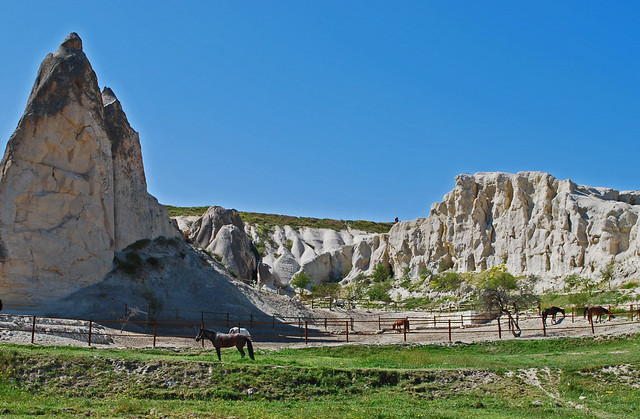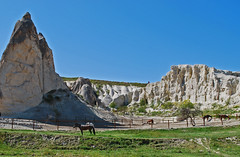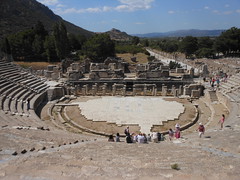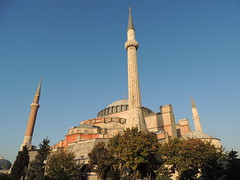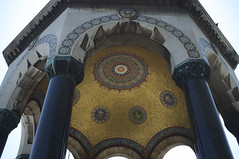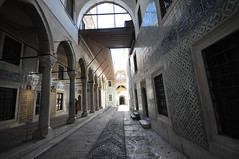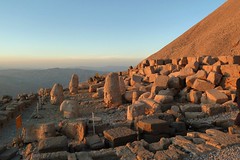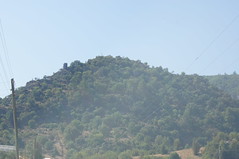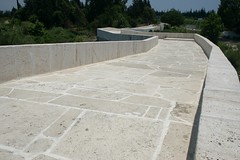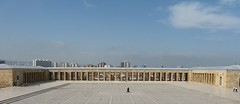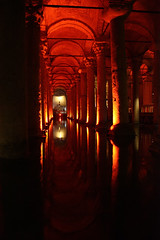 Turkey
Turkey
Turkey (Turkish: Türkiye Turkish: [ˈtyɾcije]), officially the Republic of Türkiye (Turkish: Türkiye Cumhuriyeti Turkish: [ˈtyɾcije dʒumˈhuːɾijeti]), is a transcontinental country located mainly on the Anatolian Peninsula in Western Asia, with a small portion on the Balkan Peninsula in Southeast Europe. It borders the Black Sea to the north; Georgia to the northeast; Armenia, Azerbaijan, and Iran to the east; Iraq to the southeast; Syria and the Mediterranean Sea to the south; the Aegean Sea to the west; and Greece and Bulgaria to the northwest. Cyprus is off the south coast. Most of the country's citizens are ethnic Turks, while Kurds are the largest ethnic minority. Ankara is Turkey's capital and second-largest city; Istanbul is its largest city and main financial centre.One of the world's earliest permanently settled regions, present-day Turkey was home to important Neolithic sites like Göbekli Tepe, and was inhabited by ancient civilizations including the Hattians, Hittites, Anatolian peoples, Mycenaean Greeks, Persians, and others.
Following the conquests of Alexander the Great which started the Hellenistic period, most of the ancient regions were culturally Hellenized, and this continued during the Byzantine era. The Seljuk Turks began migrating to Anatolia in the 11th century, which started the Turkification process. The Seljuk Sultanate of Rum ruled Anatolia until the Mongol invasion in 1243, when it disintegrated into small Turkish principalities. Beginning in the late 13th century, the Ottomans united the principalities and conquered the Balkans, while the Turkification of Anatolia further progressed during the Ottoman period. After Mehmed II conquered Constantinople (now Istanbul) in 1453, Ottoman expansion continued under Selim I. During the reign of Suleiman the Magnificent, the Ottoman Empire became a global power.
From the late 18th century onwards, the empire's power declined with a gradual loss of territories. Mahmud II started a period of modernization in the early 19th century. The Young Turk Revolution of 1908 restricted the authority of the Sultan and restored the Ottoman Parliament after a 30-year suspension, ushering the empire into a multi-party period. The Three Pashas took control with the 1913 coup d'état, and the Ottoman Empire entered World War I as one of the Central Powers in 1914. During the war, the Ottoman government committed genocides against its Armenian, Greek and Assyrian subjects. After its defeat in the war, the Ottoman Empire was partitioned.
The Turkish War of Independence against the occupying Allied Powers resulted in the abolition of the Sultanate on 1 November 1922, the signing of the Treaty of Lausanne (which superseded the Treaty of Sèvres) on 24 July 1923 and the proclamation of the Republic on 29 October 1923. With the reforms initiated by the country's first president, Mustafa Kemal Atatürk, Turkey became a secular, unitary and parliamentary republic. Turkey remained neutral during most of World War II, but entered the closing stages of the war on the side of the Allies.
Turkey played a prominent role in the Korean War and joined NATO in 1952. During the Cold War years, the country endured two military coups in 1960 and 1980, and a period of economic and political turmoil in the 1970s. The economy was liberalized in the 1980s, leading to stronger economic growth and political stability. Since 2002, the country's political system has been dominated by the AKP and its leader Recep Tayyip Erdoğan, under whom a decade of rapid growth in nominal GDP took place until 2013, which was followed by a period of recession and stagnation in terms of USD-based nominal GDP between 2013 and 2020, and high inflation as of 2023. The AKP government's initial economic achievements, which were financed through privatization revenues and loans, were overshadowed by democratic backsliding and an erosion in the separation of powers and civil liberties, which gained momentum after the parliamentary republic was replaced by an executive presidential system with a referendum in 2017.
Turkey is a regional power with a geopolitically significant strategic location. The economy of Turkey, which is a founding member of the OECD and G20, is classified among the E7, EAGLEs and NICs, and currently ranks twentieth-largest in the world by nominal GDP and eleventh-largest by PPP. Turkey is a charter member of the United Nations, the IMF and the World Bank; a founding member of the OSCE, OIC, BSEC, ECO, MIKTA, TURKSOY and OTS; and an early member of NATO. After becoming one of the early members of the Council of Europe in 1950, Turkey became an associate member of the EEC in 1963, joined the EU Customs Union in 1995, and started accession negotiations with the European Union in 2005. Turkey has a rich cultural legacy shaped by centuries of history and the influence of the various peoples that have inhabited its territory over several millennia; it is home to 19 UNESCO World Heritage Sites and is among the most visited countries in the world.
Name
The name
Turkey appeared in Western sources after the Crusades. The English name Turkey (from Medieval Latin /) means "land of the Turks".
Middle English usage of
is evidenced in an early work by Geoffrey Chaucer called The Book of the Duchess . The phrase is used in the 15th-century Digby Mysteries. Later usages can be found in the William Dunbar poems, the 16th century (Turkie) and Francis Bacon's (Turky). The modern spelling Turkey dates back to at least 1719.
In the 14th-century Arabic sources,
Turkiyya is usually contrasted with Turkmaniyya (Turkomania), probably to be understood as Oghuz in a broad sense. In the 1330s, Ibn Battuta defined the region as ("the Turkish land known as the lands of Rûm").
The disintegration of the country after World War I strengthened Turkish nationalism, and the
("Turkey for the Turks") sentiment rose up. With the Treaty of Alexandropol signed by the Government of the Grand National Assembly with Armenia, the name Türkiye entered international documents for the first time. In the treaty signed with Afghanistan in 1921, the expression Devlet-i Âliyye-i Türkiyye ("Sublime Turkish State") was used, likened to the Ottoman Empire's name.
In December 2021, President Erdoğan issued a circular, calling for exports to be labeled "Made in Türkiye". The circular also stated that in relation to other governmental communications, the "necessary sensitivity will be shown on the use of the phrase 'Türkiye' instead of phrases such as 'Turkey', 'Türkei', 'Turquie', etc." The reason given in the circular for preferring
Türkiye was that it "represents and expresses the culture, civilization, and values of the Turkish nation in the best way".
Official name change
The Turkish government notified the United Nations and other international organizations in May 2022, requesting that they use
Türkiye, which the UN immediately agreed to do. The United States Department of State officially began using Türkiye in January 2023.
History
Prehistory of Anatolia and Eastern Thrace
The Anatolian peninsula, comprising most of modern Turkey, is one of the oldest permanently settled regions in the world. Various ancient Anatolian populations have lived in Anatolia, from at least the Neolithic until the Hellenistic period. Many of these peoples spoke the Anatolian languages, a branch of the larger Indo-European language family. Given the antiquity of the Indo-European Hittite and Luwian languages, some scholars have proposed Anatolia as the hypothetical centre from which the Indo-European languages radiated. The European part of Turkey, called Eastern Thrace, has been inhabited since at least 40,000 years ago, and is known to have been in the Neolithic era by about 6000 BC. The spread of agriculture from the Middle East to Europe was strongly correlated with the migration of early farmers from Anatolia about 9,000 years ago, and was not just a cultural exchange. Anatolian Neolithic farmers derived a significant portion of their ancestry from the Anatolian hunter-gatherers.
Göbekli Tepe is the site of the oldest known man-made structure in the world, a temple dating to circa 9600 BC, while Çatalhöyük is a very large Neolithic and Chalcolithic settlement in Anatolia, which existed from approximately 7500 BC to 5700 BC. It is the largest and best-preserved Neolithic site found to date. Nevalı Çori was an early Neolithic settlement on the middle Euphrates, in Şanlıurfa. The Urfa Man statue is dated c. 9000 BC, to the period of the Pre-Pottery Neolithic, and is defined as "the oldest known naturalistic life-sized sculpture of a human". It is considered to be contemporaneous with Göbekli Tepe. Troy was first settled in the Neolithic Age, with inhabitation continuing into the Byzantine period. Troy's Late Bronze Age layers are considered potential historical settings for the later legends of the Trojan War.
The earliest recorded inhabitants of Anatolia were the Hattians and Hurrians, non-Indo-European peoples who lived in Anatolia, respectively, as early as c. 2300 BC. Indo-European Hittites came to Anatolia and gradually absorbed the Hattians and Hurrians c. 2000–1700 BC. The first empire in the area was founded by the Hittites, from the 18th through the 13th centuries BC. The Assyrians conquered and settled parts of southeastern Turkey as early as 1950 BC although they have remained a minority in the region.
Following the collapse of the Hittite empire c. 1180 BC, the Phrygians, an Indo-European people, achieved ascendancy in Anatolia until their kingdom was destroyed by the Cimmerians in c. 695 BC. The most powerful of Phrygia's successor states were Lydia, Caria and Lycia.
Assyrian king Shalmaneser I (1263–1234 BC) recorded a campaign in which he subdued the entire territory of "Uruatri". Urartu re-emerged in Assyrian inscriptions in the 9th century BC. Starting from 714 BC, the Urartu state began to decline, and finally dissolved in 590 BC, when it was conquered …
